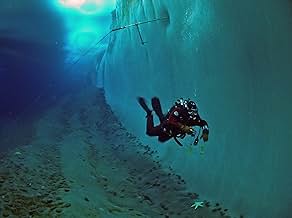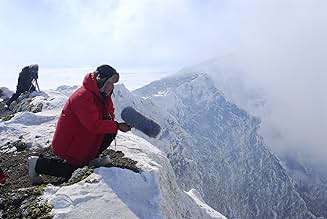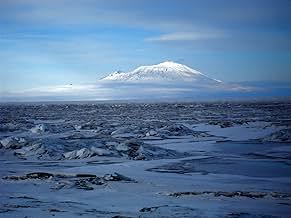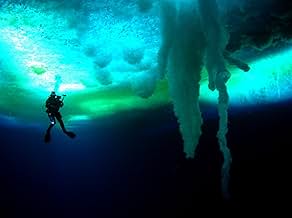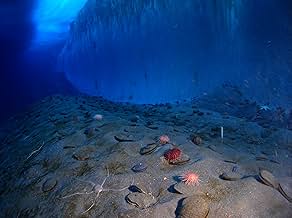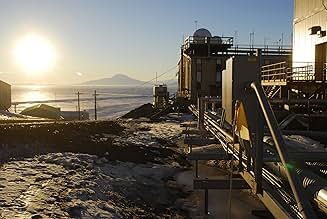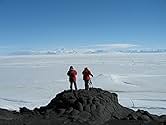Adicionar um enredo no seu idiomaFilm-maker Werner Herzog travels to the McMurdo Station in Antarctica, looking to capture the continent's beauty and investigate the characters living there.Film-maker Werner Herzog travels to the McMurdo Station in Antarctica, looking to capture the continent's beauty and investigate the characters living there.Film-maker Werner Herzog travels to the McMurdo Station in Antarctica, looking to capture the continent's beauty and investigate the characters living there.
- Indicado a 1 Oscar
- 2 vitórias e 16 indicações no total
- Self - Glaciologist
- (as Douglas MacAyeal)
- Self - Filmmaker, Cook
- (as Ryan A. Evans)
Avaliações em destaque
Almost a companion piece to Herzog's earlier poem-like Fata Morgana, the film brings us into a world hidden to almost all but a very chosen few.
There are incredible exchanges between Herzog and his human subjects, who are all researchers studying various aspects of the Antarctic eco-sphere. One such exchange with a cell biologist involves the idea that humans evolved from the ocean to escape what the scientist terms the 'absolute horror' of existence among the extremely vicious, often microscopic 'monsters' that savagely fight for their existence in the frozen waters. Some of these creatures are shown in remarkable underwater photography and it's not hard to see what he means.
Another interview that I found both terrifying and fascinating was one with a journeyman plumber (who also is allegedly related to the Ancient Aztec royalty) about the effects of global warming. I didn't like 'An Inconvenient Truth' and have always been somewhat on the fence about global warming. But the way this man describes global warming set the hairs on my arms on end. The subject is returned to later in the film with several scientists advocating an even bleaker outlook on the topic. Their consensus is that we have already tipped the point of no return and that our existence as humans is already marked for extinction.
As one glacierologist, pointing at a radar screen showing formations of large glaciers puts it: "I don't want to know what happens when that melts." By the way, did you know that seal calls are like the sound of Moog synths and earlier Pink Floyd? I haven't even scratched the surface of this film. There are so many breathtaking moments of sheer rugged beauty that it will bring tears to your eyes.
Do not see this movie on video or DVD. Unlike 'Grizzly Man' which was more of a television format film, "Encounters At the End of The World" is deeply, deeply cinematic.
How many Bat-films do you need to see anyway? Do your brain a favor and lose yourself in 'Encounters at the End of The World'.
Best film of '08 hands down.
This is not Shackleton's Antarctica. The main US base is more like a mining colony anywhere on the fringes of civilization then what you think of when you think Antarctica. Its strangely modern and looks to be almost anywhere people mine. Indeed there is an odd shot of the modern camp with Scott's hut in the distance that signals how times have changed.
Herzog's film is really about some of the wayward travelers who have reached the frontier. Herzog is curious what sort of people they are and finds them to be a rather philosophical lot. They are what you would consider explorers of the 18th or 19th century looking for something greater then themselves. As one guy says "Where else do you find guys with Phds doing the dishes, or linguists on the one place on earth where there is no native language." Its an amusing portrait of people I think many of us would like to be.
We also get a portrait of what life is like there. Of the eternal sun (which annoys Herzog)Of the drabness of the living quarters (motel like)mixed with individual expression. We see the survival training, the various scientific studies going on (including one about penguins which cause Herzog to ponder if they go mad). and we see the landscape both above and below the ice on land and in the sea. These portraits of the land and seascapes are stunning. Herzog's ability to mix music and image creates some hypnotic passages that in part reminded me Koyaanisqatsi or Luc Besson's Atlantis. Its magical and creates sequences that you hate to see end.
If there is any flaw is that the film kind of just ends. There is a wonderful final quote by Alan Watts, but the film ultimately feels like a philosophical travelogue about a summer vacation instead of something grander then what I saw on my vacation. I'm sure had it not been Werner Herzog behind the camera I would not have been disappointed.
Still you must see the film on a big screen if you can. Its really beautiful at times. It will enlighten and inspire you- much more than this review will. And even though this is a Discovery Channel film, I'm glad I saw it where I did because there is something about the end credits with the seal songs echoing all thorough the theater from front to back that you can't get at home. The long confines of the Film Forum in New York really allows for the magic of a sound scape.
7.5 out of 10
But, the film STILL is mesmerizing. You learn about the very unearthly sort of sounds the seals make under the ice, the sad story of a mixed-up penguin, some amazing volcano research and lots of odd facts about this MOSTLY desolate continent. Well worth seeing--just don't be too turned off by the occasionally bizarre dialog.
Interestingly, it seems that this is less by design than by accidents that occur because he chooses to put his camera in places where the cosmos is unstable. Sometimes it rewards deeply, because we find our own window into beautiful chaos. Sometimes the experiments fail, and you can see how he has tried to distract us with observations from himself rather than the world he has placed us in.
This is such a failure. He goes, enticed by the promise of cruel, unfathomable beauty. He finds no accident with inherent narrative, so he inserts his own. Unfortunately, Herzog the man and mind is the least interesting element of any Herzog film. I know I am in the minority here, because he has a celebrity persona.
But watch this, and see how he interviews his subjects. He is trying to cast them as beautiful souls doomed be a part of the ugliness of humanity. Some of the interviews are staged or rehearsed. He admits this. I know the words are genuinely from the people who speak them, but the narrative is false. Herzog has this notion — this essentially Austrian notion — that nature is only full when it is cruel, stark and dangerous. Humanity is unnatural; only a few butterfly souls escape, and they are to be cherished.
So look here: we have his usual Wagnerian chorus, using internationally fused sounds. We have some nature, always presented as cosmically unfriendly. We have episodes that underscore the hopeless weakness of society. And we have characters that engage and inspire. But it all seems so desperately constructed here. Whether he likes it or not, he has simply made a penguin film, but with humans.
Ted's Evaluation -- 2 of 3: Has some interesting elements.
Você sabia?
- CuriosidadesWerner Herzog dedicated the film to Roger Ebert, who he calls a true "warrior of cinema". Due to the dedication Ebert could not review the film, but he wrote a complimentary letter to Herzog and later published it.
- Citações
[last lines]
Stefan Pashov: There is a beautiful saying by an American philosopher, Alan Watts. He used to say that through our eyes the universe is perceiving itself, and through our ears the universe is listening to its cosmic harmonies. And we are the witness to which the universe becomes conscious of its glory, of its magnificence.
- ConexõesEdited from O Mundo em Perigo (1954)
- Trilhas sonorasPlanino Stara Planino Mari
Written by Stefan Dragostinov
Performed by The Philip Koutev National Folk Ensemble
Principais escolhas
- How long is Encounters at the End of the World?Fornecido pela Alexa
Detalhes
- Data de lançamento
- País de origem
- Central de atendimento oficial
- Idiomas
- Também conhecido como
- Encounters at the End of the World
- Locações de filme
- Empresas de produção
- Consulte mais créditos da empresa na IMDbPro
Bilheteria
- Faturamento bruto nos EUA e Canadá
- US$ 944.933
- Fim de semana de estreia nos EUA e Canadá
- US$ 17.730
- 15 de jun. de 2008
- Faturamento bruto mundial
- US$ 1.205.464
- Tempo de duração
- 1 h 39 min(99 min)
- Cor
- Mixagem de som
- Proporção
- 1.78 : 1







